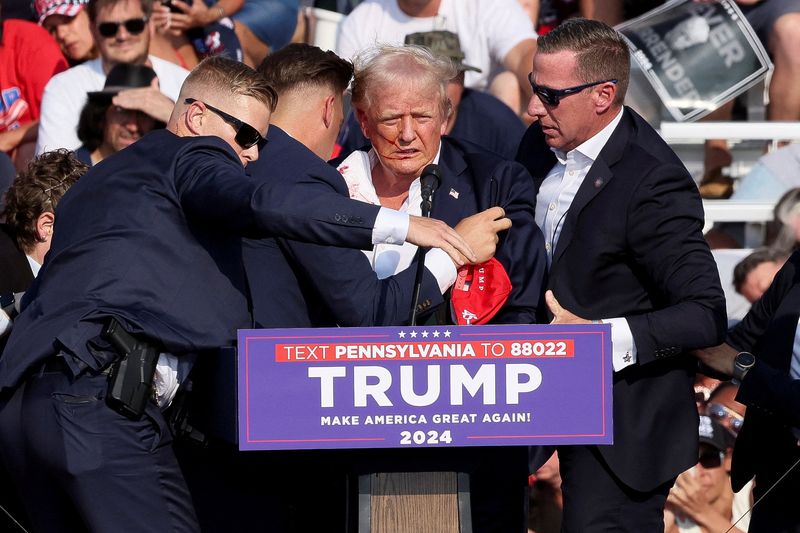[ad_1]
By Nathan Layne, Brendan McDermid and Jeff Mason
BUTLER, Pennsylvania (Reuters) -Donald Trump was shot in the ear during a campaign rally on Saturday after a major security lapse, an attack that will likely reshape this year’s presidential race and fuel long-standing fears that the campaign could descend into political violence.

In the moments after the shooting, Trump was swarmed and covered up by his security agents. He quickly emerged, his face streaked with blood, and pumped his fist in the air, mouthing the words „Fight! Fight! Fight!” The Trump campaign later said he was „doing well.”
The FBI identified 20-year-old Thomas Matthew Crooks of Bethel Park, Pennsylvania, as the „subject involved” in what it termed an attempted assassination in a statement early on Sunday. He was a registered Republican, according to state voter records.
Earlier the Secret Service said in a statement that the shooter was dead, one attendee at the rally was killed and two other spectators were injured. Law enforcement officials told reporters they not yet identified a motive for the attack.
Trump, 78, had just started his speech when the shots rang out. He grabbed his right ear with his right hand, then brought his hand down to look at it before dropping to his knees behind the podium before Secret Service agents covered him.
He emerged about a minute later, his red „Make America Great Again” hat knocked off, and could be heard saying „wait, wait,” before pumping his fist in the air. Agents then rushed him to a black SUV.
„I was shot with a bullet that pierced the upper part of my right ear,” Trump said later on his Truth Social platform following the shooting in Butler, Pennsylvania, about 30 miles (50 km) north of Pittsburgh. „Much bleeding took place.”
He left the Butler area under the protection of the U.S. Secret Service with the assistance of the Pennsylvania state police and later arrived at his golf resort and residence in Bedminster, New Jersey.
The shooting occurred less than four months before the Nov. 5 election, when Trump, the Republican candidate, faces an election rematch with Democratic President Joe Biden. Most opinion polls including those by Reuters/Ipsos show the two locked in a close contest.
Trump is due to receive his party’s formal nomination at the Republican National Convention, which kicks off in Milwaukee on Monday.
The shooting raised immediate questions about security failures by the Secret Service, which provides former presidents including Trump with lifetime protection.
It was the first shooting of a U.S. president or major party candidate since the 1981 attempted assassination of Republican President Ronald Reagan.
’NO PLACE’ FOR SUCH VIOLENCE
Leading Republicans and Democrats quickly condemned the violence.
„There’s no place for this kind of violence in America. We must unite as one nation to condemn it,” Biden said in a statement.
Ron Moose, a Trump supporter at the rally, said he heard about four shots. „I saw the crowd go down and then Trump ducked also real quick,” he said. „Then the Secret Service all jumped and protected him as soon as they could. We are talking within a second they were all protecting him.”
The BBC interviewed a man who described himself as an eyewitness, saying he saw a man armed with a rifle crawling up a roof near the event. The person, who the BBC did not identify, said he and the people he was with started pointing at the man, trying to alert security.
The shots appeared to come from outside the area secured by the Secret Service, the agency said. The FBI said it had taken the lead in investigating the attack.
At a briefing late on Saturday, FBI officials told reporters it was surprising that the suspect was able to fire multiple shots. The Secret Service did not have a representative at that briefing, which included FBI and state law enforcement officials.
Hours after the attack, the Oversight Committee in the Republican-led U.S. House of Representatives summoned U.S. Secret Service Director Kimberly Cheatle to testify at a hearing scheduled for July 22.
„Americans demand answers about the assassination attempt of President Trump,” the panel said in a statement on social media.
REPUBLICANS, DEMOCRATS DECRY VIOLENCE
The attack heightened longstanding worries that political violence could erupt during the presidential campaign and after the election. The concerns in part reflect the electorate’s polarization, with the country appearing bitterly divided into two camps with divergent political and social visions.
„This horrific act of political violence at a peaceful campaign rally has no place in this country and should be unanimously and forcefully condemned,” Republican House Speaker Mike Johnson said on social media.
Democratic Senate Majority Leader Chuck Schumer said he was horrified by what happened and was relieved Trump was safe. „Political violence has no place in our country,” he said.
Biden’s campaign was pausing its television ads and halting all other outbound communication, a campaign official said.
Americans fear rising political violence, recent Reuters/Ipsos polling shows, with two out of three respondents to a May survey saying they worried violence could follow the election.
Some of Trump’s Republican allies said they believed the attack was politically motivated.
„For weeks Democrat leaders have been fueling ludicrous hysteria that Donald Trump winning re-election would be the end of democracy in America,” said U.S. Representative Steve Scalise, the No. 2 House Republican, who survived a politically motivated shooting in 2017.
„Clearly we’ve seen far left lunatics act on violent rhetoric in the past. This incendiary rhetoric must stop.”
Trump, who served as president from 2017-2021, easily bested his rivals for the Republican nomination early in the campaign.
He has largely unified around him the party that had briefly wavered in support after his supporters attacked the U.S. Capitol on Jan. 6, 2021, attempting to overturn his 2020 election defeat.
The businessman and former reality television star entered the year facing a raft of legal worries, including four separate criminal prosecutions.

He was found guilty in late May of trying to cover up hush money payments to a porn star, but the other three prosecutions he faces — including two for his attempts to overturn his defeat — have been ground to a halt by various factors including a Supreme Court decision early this month that found him to be partly immune to prosecution.
Trump contends, without giving evidence, that all four prosecutions have been orchestrated by Biden to try to prevent him from returning to power.
[ad_2]
Source link

